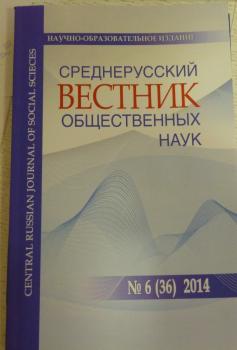The authors analyze various theoretical concepts on which they substantiate the following: the more hegemonic and unilateral the world order became, the more inhibited interstate dialogue on disarmament was, more and more coming into the crisis. This is also the format of intergovernmental negotiations in general, in particular long-term non-participation of Russia in the "group of seven". Revision of the theoretical foundations is accompanied by a change in emphasis in the dialogue on disarmament, its reactivation and the continuation of more equal footing. According to Galtung, that is the way to express the so-called pluralistic unipolarity, marking the transition from unilateralism to leadership. The constructive position of Russia - search for constructive forms of partnership with the West and the rapprochement with China.
disarmament, transformation of the international system, theoretical concepts of globalization, alternative models of development, crisis of disarmament policy, hegemonic stability, pluralistic unipolarity
1. Bogaturov A.D. Velikie derzhavy na Tikhom okeane. Istoriya i teoriya mezhdunarodnykh otnosheniy v Vostochnoy Azii posle vtoroy mirovoy voyny (1945- 1995). - M., 1997.
2. Bogaturov A.D. Plyuralisticheskaya odnopolyarnost´ i interesy Rossii. Vneshnyaya politika i bezopasnost´ sovremennoy Rossii, 1991-2002. Khrestomatiya. V 4 t. / MGIMO(U) MID Rossii; Ros. assotsiatsiya mezhdunar. issledovaniy; INO-Tsentr (Informatsiya. Nauka. Obrazovanie); Sost. T.A. Shakleina. - M.: ROSSPEN, 2002. - S. 281 - 292.
3. Slin´ko A.A. Politicheskie osobennosti krizisnogo etapa mirovogo razvitiya: problemy i protivorechiya. Vestnik Voronezhskogo gosudarstvennogo universiteta. Seriya: Istoriya. Politologiya. Sotsiologiya. - 2013. - № 2. - S. 184 - 186.
4. Sorokin K.E., Bogaturov A.D., Tikhomirov V.B. Kriticheskiy obzor modeli unipolyarnosti (diskussiya). Polis. Politicheskie issledovaniya. - 1997. - № 2. - S. 45 - 55.
5. Straus A.L. Unipolyarnost´. Kontsentricheskaya struktura novogo mirovogo poryadka i pozitsiya Rossii. Polis. Politicheskie issledovaniya. - 1997. - №2. - S. 27 - 44.
6. Galtung Johan On the Coming Decline and Fall of the US Empire. TRANSCEND official website. - January 28, 2004 - URL: http://www.oldsite.transnational.org/SAJT/forum/meet/2004/Galtung_USempireFall.html)
7. Gilpin R. The Political Economy of International Relations. Princeton: Princeton University Press, 1987.
8. Kennedy P. The Rise and Fall of the Great Powers: Economic Change and Military Conflict from 1500 to 2000. - N. Y.: Random House, 1987.
9. Keohane R.O., Nye J.S. (J.). Transnational Relations and World Politics. - Cambridge, Ma: Harvard University Press, 1972.
10. Nye Joseph Jr. Bound to Lead. The Changing Nature of American Power. Basic Books.-1990. -307 p.
11. Nye Joseph Jr. The Paradox of American Power: Why the World’s Only Superpower Can’t Go It Alone. - Oxford University Press, 2002.
12. Robert O. Keohane. After Hegemony. Cooperation and Discord in the World Political Economy. Princeton: Princeton University Press, 1984.





